As part of a comprehensive plan to recycle more of the state’s solid waste stream, New York Gov. Kathy Hochul has proposed to greatly increase the rate of spreading sewage sludge on New York’s farmland.
Sewage sludge is a semi-solid mix of human excrement, toilet paper, household products that go down drains and industrial waste that water treatment plants produce. It’s expensive to dispose of and nationally about 60% of this partially treated waste product is sold or even given away as “biosolid” fertilizer because it contains nutrients for plant growth.
Meanwhile, the State of Maine proposed and passed legislation to do the exact opposite – to ban sewage sludge fertilizer from being spread on farms after environmental officials discovered very high levels of per-and polyfluorinated substances (PFAS) in water, soil, crops, and animals on farms where biosolids had been spread. High PFAS levels were also detected in the milk from cows pastured on treated fields.
PFAS are a class of about 12,000 chemicals used to make thousands of consumer and industrial products resistant to water, stain and grease. They are called “forever chemicals” because they never break down, and they are linked to serious illnesses, including several types of cancer, liver disease, kidney disease, autoimmune disorders, ulcerative colitis, thyroid disease, and damage to the health of pregnant women and babies.
Currently, Maine is investigating several hundred farms with fields where PFAS-contaminated sewage sludge was spread in recent years. If these farms test positive for PFAS, the land will be considered permanently contaminated and banned for agricultural use of any kind. Several farms have already been shuttered, leaving farmers in financial ruin.
PFAS are arguably one of today’s most significant public health issues as they are ubiquitous and to date very poorly controlled. Regulatory agencies are scrambling to set standards for drinking water and to limit commercial and consumer usage, but this is no easy task. PFAS compounds are carcinogenic in just a few parts per trillion. That’s comparable to just a few grains of salt in an Olympic sized swimming pool.
While New York is not testing for PFAS contamination on our farms, random testing of biosolids in several wastewater treatment plants across the state found PFAS in every one. Nevertheless, the Department of Environmental Conservation has not tested the land where this sludge was spread nor has it informed the landowners or farmers of the risk. And it only recently decided to expand its testing of sewage sludge for PFAS.
Farmers in New York today can easily and legally purchase sewage, sludge-based fertilizer and compost products from private companies. Gardeners, landscapers, municipalities and school districts can do so as well. The DEC provides no warning.
In 2021, New York joined the growing national trend of prioritizing soil health with the Soil Health and Climate Resiliency Act that “declared the policy of the Legislature to promote the health and resiliency of New York’s agricultural soils, including the biological, physical, and chemical components of such soils, to sustain agricultural plants and animals, produce a healthy, affordable food supply, promote climate resilient farming and the reduction of agricultural greenhouse gas emissions, and further protect and promote natural resources and the health, safety and welfare of the people of this state.” New York State’s current proposal flies in the face of this important and protective declaration.
Sierra Club’s Atlantic Chapter has produced a comprehensive report outlining the toxicity of PFAS and the irreversible impacts PFAS contamination will have on agriculture and drinking water sources in New York State and the urgency to take protective actions immediately to prevent any spreading of biosolids or sewage sludge on farmland in New York. Their most urgent actions include, but are not limited to:
- Banning the spreading of sewage sludge in any form on fields and farms and end the production, sale and distribution of any products containing sewage sludge due to strong evidence of their widespread contamination with PFAS.
- Monitoring and testing of wastewater treatment plant effluent for PFAS.
- Prohibiting wastewater treatment plants from accepting landfill leachate, unless PFAS contaminants are destroyed or removed beforehand.
- Banning the practice of mixing food waste (a relatively clean organic feedstock) with sewage sludge.
- Directing the DEC to test for PFAS in soil, water and agricultural products grown where sewage sludge-based soil amendments are known to have been spread.
To see the full version of the report, visit https://atlantic2.sierraclub.org
If you feel passionate about the safety of our water and food, please contact Gov. Hochul by phone (518-474-8390) or e-mail www.governor.ny.gov/content/governor-contact-form and tell her of the dire consequences of her proposal to address our solid waste excess by spreading PFAS-contaminated sewage sludge across our state.

